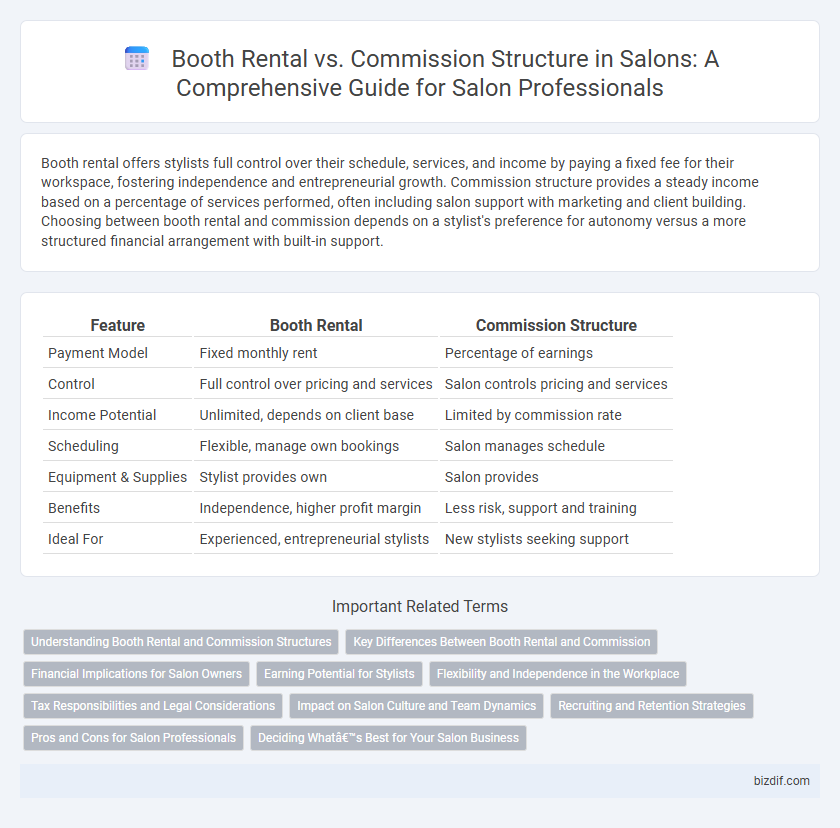Booth rental offers stylists full control over their schedule, services, and income by paying a fixed fee for their workspace, fostering independence and entrepreneurial growth. Commission structure provides a steady income based on a percentage of services performed, often including salon support with marketing and client building. Choosing between booth rental and commission depends on a stylist's preference for autonomy versus a more structured financial arrangement with built-in support.
Table of Comparison
| Feature | Booth Rental | Commission Structure |
|---|---|---|
| Payment Model | Fixed monthly rent | Percentage of earnings |
| Control | Full control over pricing and services | Salon controls pricing and services |
| Income Potential | Unlimited, depends on client base | Limited by commission rate |
| Scheduling | Flexible, manage own bookings | Salon manages schedule |
| Equipment & Supplies | Stylist provides own | Salon provides |
| Benefits | Independence, higher profit margin | Less risk, support and training |
| Ideal For | Experienced, entrepreneurial stylists | New stylists seeking support |
Understanding Booth Rental and Commission Structures
Booth rental involves salon professionals leasing a space to operate independently, retaining full control over their services and income while paying a fixed fee to the salon. Commission structure means stylists work as employees or contractors, earning a percentage of their service fees, with the salon managing bookings, supplies, and marketing. Understanding these models helps professionals choose between autonomy with consistent rent costs and potential income variability tied to commission rates.
Key Differences Between Booth Rental and Commission
Booth rental offers salon professionals full control over their schedule, services, and pricing while paying a fixed monthly fee for their space, maximizing their profit potential but assuming all business expenses. In contrast, commission structure involves stylists receiving a percentage of their service sales, with the salon managing appointments, marketing, and overhead costs, providing stability but limiting income growth. Key differences include financial risk distribution, operational independence, and income predictability, which influence career choice and business management in the salon industry.
Financial Implications for Salon Owners
Booth rental provides salon owners with a fixed, predictable income stream, reducing financial risk but limiting potential earnings from individual stylist performance. Commission structures align owner revenue with stylist productivity, often increasing total income during high-demand periods but introducing variability in monthly cash flow. Evaluating local market rates and stylist expertise is crucial for optimizing profitability under either financial model.
Earning Potential for Stylists
Booth rental offers stylists complete control over their earnings by allowing them to keep 100% of the fees they charge, minus overhead costs, making it ideal for those with a strong client base and business acumen. Commission structures provide a steady income with less financial risk, as stylists earn a percentage of each service performed, though this often results in lower overall earnings compared to booth rental. Stylists seeking maximum earning potential should weigh their ability to manage expenses, attract clients, and handle business responsibilities before choosing between booth rental and commission models.
Flexibility and Independence in the Workplace
Booth rental offers salon professionals maximum flexibility and independence, allowing stylists to set their own schedules and retain full control over their client pricing and services. In contrast, commission-based structures provide less autonomy, as stylists must adhere to salon policies and share earnings, often resulting in limited control over work hours and income. Choosing booth rental empowers stylists to build their personal brand and business while enjoying a flexible work-life balance.
Tax Responsibilities and Legal Considerations
Booth rental in salons requires professionals to handle their own tax filings, including self-employment taxes and deductions for business expenses, while commission-based stylists have taxes withheld by the employer but may face limitations on deductible expenses. Legal considerations for booth renters include obtaining proper business licenses and liability insurance, whereas employees under commission agreements benefit from employer-provided protections but must comply with workplace policies. Understanding these distinctions ensures compliance with tax regulations and safeguards legal rights within salon operations.
Impact on Salon Culture and Team Dynamics
Booth rental fosters entrepreneurial independence, encouraging stylists to manage their schedules and client base, which can create a more individualistic salon culture but may reduce collaboration and team cohesion. Commission structures promote shared goals and accountability, enhancing teamwork and consistent service quality among stylists while potentially increasing competition and pressure. Choosing between booth rental and commission impacts salon culture by balancing stylist autonomy with collective synergy, directly influencing team dynamics and overall workplace atmosphere.
Recruiting and Retention Strategies
Booth rental offers stylists autonomy and higher profit potential, attracting entrepreneurial talent and improving retention by fostering independence and flexible scheduling. Commission structures provide consistent income and salon support, appealing to newer stylists and enhancing recruitment through built-in client bases and team resources. Combining tailored incentives and clear growth paths in both models strengthens recruitment efforts and reduces turnover in competitive salon markets.
Pros and Cons for Salon Professionals
Booth rental offers salon professionals financial independence with fixed monthly fees and the ability to set their own prices, but it requires managing all business aspects, including marketing and supplies. Commission structures provide steady income streams and reduced overhead costs since the salon supplies products and handles bookings, yet earnings fluctuate based on client volume and commission rates, limiting financial control. Choosing between booth rental and commission depends on individual priorities like income stability, autonomy, and willingness to handle administrative responsibilities.
Deciding What’s Best for Your Salon Business
Booth rental offers salon professionals fixed monthly income, fostering independence and reducing managerial responsibilities for salon owners. Commission structures align stylist earnings with their performance, motivating higher service quality and client retention, which can boost overall salon revenue. Choosing between booth rental and commission depends on your salon's business goals, financial stability, and desired level of operational control.
Booth Rental vs Commission Structure Infographic

 bizdif.com
bizdif.com